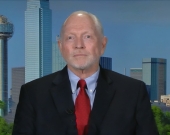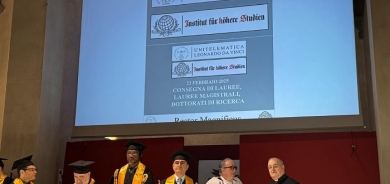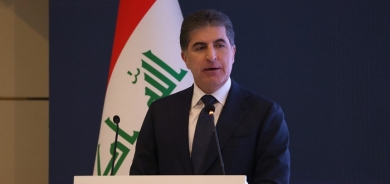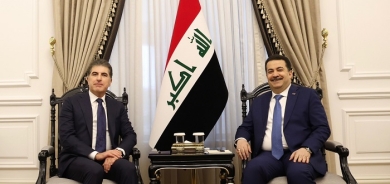Dr. Josef Olmert to Gulan: The response until now for the new situation in Syria is mostly wait and see

Dr. Josef Olmert's career spans three decades. A native of Israel, he was formerly a professor of Middle Eastern Studies at Tel Aviv, Hebrew, and Bar-Ilan Universities in his home country. He has previously taught at Cornell University, City College of New York, and York University (Canada).
In addition to his teaching work, Dr. Olmert served in senior positions in the Israeli government, such as the Director of Communications under Prime Minister Yitzhak Shamir and Policy Advisor to Defense Minister Moshe Arens. Dr. Olmert served diplomatic missions across the world and was a participant at the Madrid Peace Conference in 1991 and subsequent Israeli/Syrian peace talks. In an interview he answered our questions as the following:
Gulan: How might the U.S. (especially the incoming US administration) and European countries respond to a new political order in Syria, and what role will they play in shaping the future contours of this country?
Dr. Josef Olmert: The response until now for the new situation in Syria is mostly wait and see but with a distinct desire to help the new rulers, or those who seem to be or look like the new rulers. Not much from Trump, and in this case I suppose the desire to help will be far less distinct than in the case of the Europeans. Trump's administration will consult with Israel, try to adapt its policy to Israel's but will be judged by the attitude to the Kurds and in particular the SDF, and that means possible confrontation with Turkey. Maybe the opposite can happen-Trump will betray the Kurds like he did after the referendum in Iraq in 2017, and as usual will accept the interests of Turkey as paramount-I hope NOT!!!-and I am somewhat optimistic about that because Trump is surrounded mostly by those who are not friends of Turkey. At any rate, the Trump people will have and I believe do try to contain the overall ambitions of Turkey in Syria, because altogether they pose a danger to Israel, but also will NOT be liked by other ME countries like Saudi Arabia. Trump will give Israel free hand in South Syria with the Druze, as it is not only an interest of Israel but also of another American ally, Jordan. With regard to Israel, the Israelis will put pressure on Trump with regard to the Kurds, and here it is an open question-will he as i indicated before yield to Turkey ambitions or insist on maintaining the Kurdish autonomy. About economic assistance-I do not see the Trump administration being generous about that, but again as it involves the Kurds-the oil in the North East part of Syria is an American interest! With the Europeans this is another story; The Europeans will be against any formal or informal partition of Syria, and will give money to the new government once there is a new one which looks stable. They will actively encourage Syrian refugees to go back, particularly from Germany and will contribute to that end. France in particular will try to use any financial assistance as a leverage upon the new government to not intervene in Lebanon.
Gulan: How will the Kurdish aspirations for autonomy be reconciled with the competing interests of regional powers, including Turkey, Iraq, and the U.S.?
Dr. Josef Olmert: KURDISH AUTONOMY IS A MUST! AT LEAST THAT!-Chances for it to continue to be are not bad but depend mostly on Trump. We know for sure what Erdoghan has in mind, but we are not sure about Trump and hopefully because of oil interests, anti-Turkish advisers and Israeli pressures he will stand fast against Turkey ambitions. ISRAEL cannot directly help the SDF because of obvious geographic and logistic problems, but can help through the US and by using its influence in the US Congress. The SDF will have to stand fast and maintain internal Kurdish unity! -it is very important Iran will have no say about the Kurdish problem/situation in Syria.
Gulan: How would the shifting power dynamics in Syria, especially after Assad’s fall, affect Iran’s relationships with its regional allies (e.g., Hezbollah in Lebanon, Iraqi Shiite militias)? What steps might Iran take to preserve these alliances in the face of these new regional dynamics?
Dr. Josef Olmert: Iran is the big loser in the new Syria-there is no question about that. The IRAN-SYRIA AXIS EXISTED FOR 40 PLUS YEARS SINCE 1979-A STRATEGIC ALLIANCE WHICH WILL NOT RETURN! Iran though will NOT abandon its regional aspirations-these aspirations are at the very basis of the regime of the Islamic Republic which is by definition a Jihadist, expansionist regime. Any attempt by them to use Syria as a basis of aggression against Israel will depend on the new Syrian regime , and it is my anticipation that NO such regime will allow it, not because of any love to ISRAEL, but because of their hatred of Iran. Also Turkey will not like to see any Iranian influence in Syria, and not support to Hizballah because of Lebanon's Sunnis objections to that. Hizballah has to be totally destroyed by Israel, and sadly Netanyahu agreed to a premature cease fire. Israel can strangle Hizballah and Iran will not be able to do much about that. They stay with Iraq and the Houthis in Yemen. In Iraq they have their allies, but NOT ALL THE SHI'IS ARE , and altogether there is a growing realization among Iraqi Shi'is that they are subjecting themselves to Iran state interests at the expense of the Iraqi state. Yemen is STILL a problem, but not only to Israel, also the US, BRITAIN AND EGYPT, which loses so much revenue due to dwindling shipping through the Suez Canal. Therefore, there will in the near future be a decisive operation against the Houthis-just a question of time, and Iran will not be able to stop it
Gulan: How will the collapse of Assad’s regime alter the balance of power between Iran and other regional actors such as Saudi Arabia, Turkey, and Israel? would Iran look to bolster its position elsewhere in the region?
Dr. Josef Olmert: Iran was very weakened towards Turkey , because of the loss of Syria and the ensuing loss of influence in Lebanon. Saudi Arabia will benefit from the defeat of the Houtis in Yemen which will happen in the near future. So what about Israel-Israel has finally!!! to make the crucial decision -when , not if , to attack and destroy the Iran nuclear program-and it can be done militarily!-NOW IS THE TIME-IRAN IS WEAK -AND TRUMP MAY BE MORE AMENABLE TOWARDS THIS If it does not happen, the Iranians will intensify , rather than decrease their nuclear program and bring it to the point of no return!!! THIS IS THE DECISION OF A LIFETIME FOR NETANYAHU as well as for TRUMP and a lot depends really on Trump resolve, not only on his rhetoric and there are signs that despite rhetoric he wants to create a last minute dialogue with the Iran regime
Gulan: How will the collapse of Assad’s regime alter the balance of power between Iran and other regional actors such as Saudi Arabia, Turkey, and Israel? would Iran look to bolster its position elsewhere in the region?
Dr. Josef Olmert: Israel achieved a great military victory but still has to turn it into a lasting political and strategic victory and that is not so simple. Behind closed doors Arab countries are happy about that, but they are hesitant about more relations, and especially Saudi Arabia which needs to be convinced that Iran will become a weak force, not threatening Saudi security and legitimacy of its regime, but also that Trump is serious about Iran and curtailing Turkish ambitions, and they also expect NETANYAHU to deliver serious concessions to the Palestinians, something which he may not wish/ be able to do It all remains to be seen















